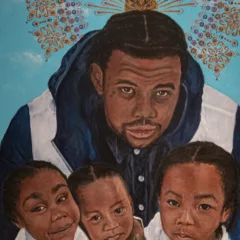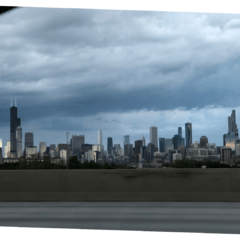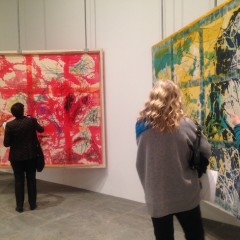
Philadelphia artists, art lovers, and advocates– we continue to publish testimonials in hopes that Mayor Kenney will restore the Office of Arts, Culture and the Creative Economy (OACCE) and the Philadelphia Cultural Fund (PCF). In this post, we hear from Julia Guerrero, Former Director of the Philadelphia Redevelopment Authority’s Percent for Art Program, Neil Kleinman, Professor (emeritus) of Innovation and Entrepreneurship, Former director, the Corzo Center for the Creative Economy at The University of the Arts, and Steven Burns, Project Director, APIARY Magazine.
Make sure you read our original post for a letter from Artblog and testimonials from leaders of Philadelphia’s arts community like Anne Ishii, Carmen Febo San Miguel, Harry Philbrick, Betty Leacraft, Nato Thompson, Jennie Shanker, Leslie Kaufman, Tristin Lowe, Virginia Maksymowicz, Billy Dufala, Amie S. Potsic, Jarrod Markman, Mark Stockton, and Christine McDonald.
Save the arts and serve all the people, restore OACCE and PCF budgets, Part 2 is a powerful letter from former Director of OACCE, Gary Steuer, Chief Cultural Officer of Philadelphia from 2008 to 2013, and Joe Kluger, Chair of the Mayor’s Cultural Advisory Councilfrom 2008 to 2015. It is not to be missed!
Continuing to fund the OACCE at a proportionally reduced level would be a gesture of support by the City for the artists and small arts organizations who help make this a great city. -Julia Guerrero
The Office of Arts, Culture and the Creative Economy was formed at the start of the Great Recession. Despite this, it was a time when people were thinking big about the role of culture in urban life, and how the arts could be one of the beacons to help get us out of those dark days. Investing in the arts and encouraging this promising young office to grow was an extraordinarily forward-looking idea by Philadelphia’s leadership, and it grew despite the bleak landscape in 2008. OACCE put the arts and the City’s support on full display. The poetic implications of the City moving their art office – literally- out of the attic and putting it on display in the most central place in City Hall was something that could only be achieved by understanding that the arts are a vital civic service.
Since its inception the OACCE has done extraordinary work despite a consistently lean operating budget. The City has both a Percent for Art Program and a Collection Management program. Thanks to them the City’s 1,000+ works of public art are beautifully maintained and kept clean and preserved, and new high-quality works of public art grace our community spaces. The City of Philadelphia’s extensive public art achievements are entirely thanks to the fact that OACCE staff includes both a Public Art Director as well as a Percent for Art Project Manager, both key to keeping the Percent for Art program and the Collection Management program running. Art in City Hall continues to put on exceptional art exhibits that bring the public into City Hall for high-quality – and free – art experiences. And the Philadelphia Cultural Fund continues to connect and provide opportunities for organizations to grow and expand their reach.
And again, we find ourselves in another dark and uncertain time. In the proposed budget the City wants to eliminate the OACCE. It will also eliminate one of the two public art staff, which will leave only one person to manage both collection management and the Percent for Art program. This can only lead to diminished services by an impossibly over-stretched staff, a true shame just a year after the celebration of the 60th anniversary of Philadelphia’s Percent for Art programs, the first of their kind in the country. Also proposed in the new budget is that the City will continue to support other arts organizations in Philadelphia, but at an understandably reduced level. Why propose a reactive, complete elimination for the OACCE rather than asking OACCE to join these other arts organizations in cuts to services and programs? Treating the arts office as an extraneous budget item that can be simply eliminated not only undoes a decade+ worth of work, but it is a statement of values regarding the role of art in civic life. Continuing to fund the OACCE at a proportionally reduced level would be a gesture of support by the City for the artists and small arts organizations who help make this a great city.
One final reflection. When my son was younger we attended an Aiko drum performance in the City Hall courtyard, which was supported by the Philadelphia Cultural Fund. The City Hall courtyard positively reverberated with the drumming and the massive, appreciative crowd. Many years later, his association with City Hall is defined by that drumming performance. And I wonder how many other people have had their perception of Philadelphia and City Hall positively shaped by the arts and arts-based experiences that were a direct result of the Office of Arts, Culture and the Creative Economy. This office and their tireless staff are well-respected arts leaders in Philadelphia and have received national recognition for their work. With renewed support from the City the OACCE can continue to be a bright light that brings people together through the arts and helps lead us towards better days.
Julia Guerrero, 2008-2019 Director of the Philadelphia Redevelopment Authority’s Percent for Art Program
The story that Philadelphia will tell is that the “arts” are not important and that the city’s spirit is not worth recognizing. -Neil Kleinman
What does Philadelphia lose when it zeroes out funding for the Arts?
Others have already written with grace and intelligence about the kind of economic impact the creative community makes on the City. Investing in the arts is a wonderful example of how a little goes a long way and how important the creative economy is in Philadelphia’s employment story.
- For every dollar invested in the arts, there’s a return of seven dollars (Lowe, Percent for Art artist). Driven by their vision, creatives are that one group of “workers” who are willing to subsidize what they produce – working at low wages, giving freely of their time.
- They are a substantial part of the workforce, representing nearly 13% of the Philadelphia workforce, a near tie (14%) to those in professional and business services and those in government (Pew Study, 2019 + Greater Philadelphia Cultural Alliance + US Bureau of Labor Statistics).
- They are small businesses (contributing to the Commonwealth and City, $224.3 M in taxes); creating jobs (55,000); serving as anchors to community and real estate development, and giving voice to disempowered communities (Greater Philadelphia Cultural Alliance + NEA: Creativity Connects).
Cut 13% of the workforce and Philadelphia will find itself with reduced taxes, higher unemployment, a generally weakened economy, and a loss in the developmental and social growth of the City.
But zeroing out funds for the Arts is not only an economic story. It tells a larger story – the story Philadelphia tells about itself. The arts in Philadelphia will survive, even without city funding. How can it not? It is the pulse of the human spirit and can’t be stopped as long as humanity exists. But it will do so despite the City and its leadership.
The story that Philadelphia will tell is that the “arts” are not important and that the city’s spirit is not worth recognizing. We will be grimmer for it and not happy about the values we have given up when we emerge from the cave of this pandemic.
Indeed, what profits us if we gain the whole world but lose our soul and starve our imagination?
Neil Kleinman, Professor (emeritus) of Innovation and Entrepreneurship, Former director, the Corzo Center for the Creative Economy at The University of the Arts
Now, for the first time ever, we are finally able to offer our staff a small stipend for their work. Imagine: People being paid to create art! This change is thanks, in part, to the PCF. -Steven Burns
The Philadelphia Cultural Fund (PCF) has been one of APIARY Magazine’s financial cornerstones. PCF has supported APIARY throughout the publication of its Soft Targets, Sanctuary, and X issues. PCF has helped us publish hundreds of writers from around the city, of all ages and backgrounds, in a gorgeous magazine available entirely free of charge. As a small, independent literary publication in an increasingly non-print world, the PCF’s flexible and recurring funding has helped us keep our lights on when other revenue streams were hard to come by. PCF has given us permission to invest time and energy into creating our next issue without asking, “Will we ever go to print?” PCF has also allowed us to become a more sustainable nonprofit. Since its inception 10 years ago, APIARY has been an all volunteer collective of writers and artists. Now, for the first time ever, we are finally able to offer our staff a small stipend for their work. Imagine: People being paid to create art! This change is thanks, in part, to the PCF. It is important to point out, however, that APIARY’s existence, like so many other arts organizations, is incredibly fragile. We operate on a 12 oz coffee and bagel budget. We do this work because we believe Philadelphia is the best literary city in the country; there needs to be a place where those writers can find space on the page. When institutions like the PCF and OACCE are defunded, opportunities for local artistic voices to find representation and receive validation are erased.
Steven Burns, Project Director, APIARY Magazine









